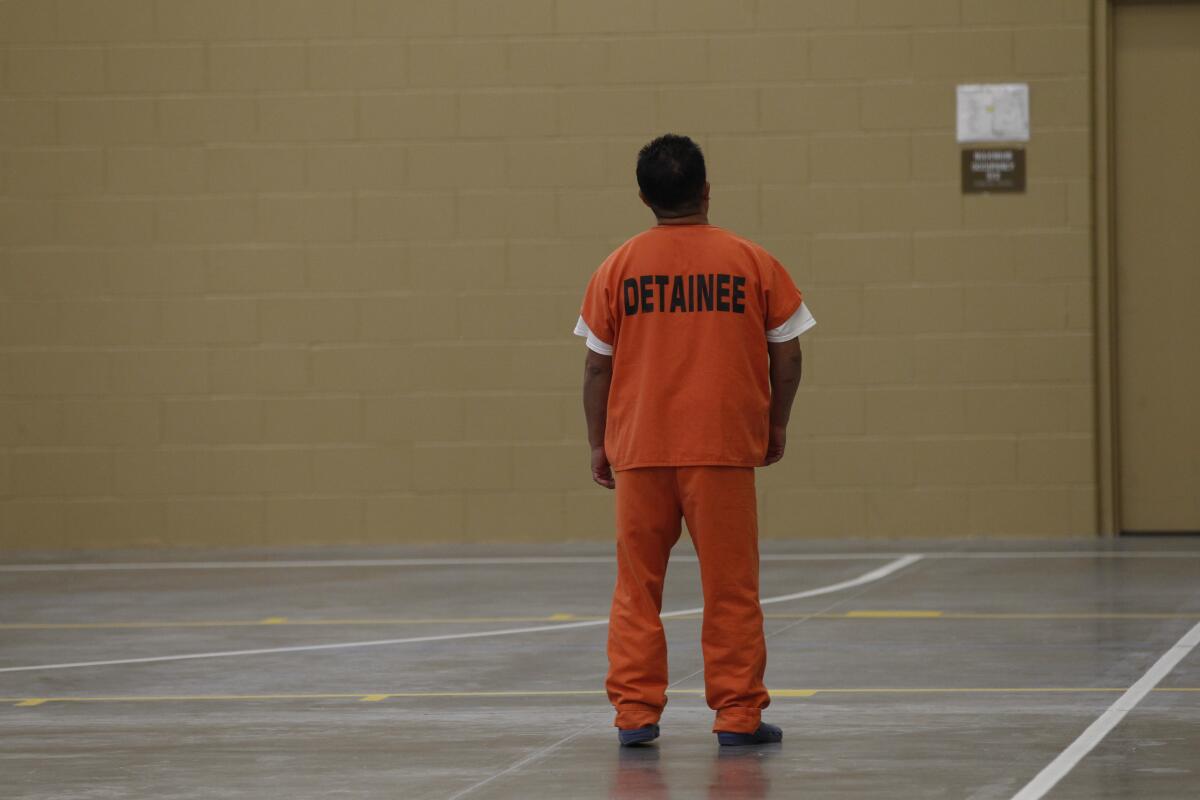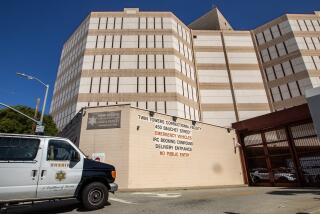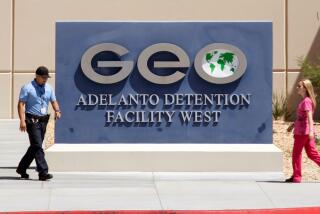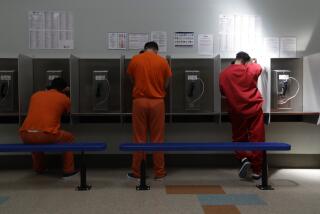‘More people are going to die’: Immigrant detainees wonder when they’ll get vaccinated

- Share via
When Ruperto Robles, 60, came down with COVID-19 early last month, he spent days with fever, muscle aches and fatigue, isolated from others at the Yuba County Jail.
Robles is being held there by U.S. Immigration and Customs Enforcement, facing deportation. An uncle and cousin in Mexico died of complications from COVID-19. With diabetes and high blood pressure, Robles worried it could lead to his death, too.
“I would like to get the vaccine to block the possibility of getting sick again,” he said. “It’s sad to see on television how many people are dying from the coronavirus.”
Advocates for immigrants say state and federal officials have waffled over who is responsible for vaccinating the roughly 1,500 detainees in the care of ICE.
ICE spokesman Alexx Pons said in a statement that the number of vaccine doses needed for detainees was reported to Department of Homeland Security planners earlier in the pandemic, but the department did not receive any direct allocation of vaccines for detainees. Vaccines received by detention facilities could be administered by medical personnel contracted or employed by ICE.
Pons said vaccines for ICE detainees are being allocated by local and state health departments and were incorporated into the COVID-19 vaccine shipments distributed by the federal government to each state.
“At this time, a limited number of ICE detainees have begun to receive the COVID-19 vaccine based on availability and priorities for vaccinating individuals in the state where they are currently detained,” he said.
California’s seven immigrant detention centers collectively can hold about 6,000 people. But the facilities have been operating at a fraction of that capacity as a result of court orders stemming from lawsuits over safety hazards amid the pandemic. All but one are managed by private prison companies.
As of Wednesday, 573 people at facilities in California had tested positive for the coronavirus. The first person known to die in ICE custody from the virus was 57-year-old Carlos Ernesto Escobar Mejia, a Salvadoran who was detained at the Otay Mesa Detention Center in San Diego in May. Nationwide, more than 9,500 detainees have tested positive for the virus and nine have died.
ICE detention centers have struggled to cope at every stage since the pandemic broke out. Outbreaks have plagued nearly every facility in the state. Detainees have responded to what they considered unsafe and unsanitary living conditions with hunger strikes and peaceful protests, leading in some cases to crackdowns by guards including use of force. Numerous lawsuits were filed over the lack of social distancing and testing.
All of this serves as a backdrop to the criticism over this latest phase of the pandemic: vaccinations.
In a court declaration Feb. 11 responding to a class-action lawsuit alleging that the federal government has failed to provide appropriate medical and mental health care for immigrant detainees, Dr. Ada Rivera, medical director of the ICE Health Service Corps, said the agency is relying on the vaccine distribution prioritization processes in each state for detainee allotments. The ICE Health Service Corps provides healthcare to 13,500 detainees in 20 detention facilities across the country. ICE contracts with outside providers for its other facilities.
“As of this declaration, no vaccine has been made available to detainees at IHSC-staffed facilities,” she wrote.
State officials said last week that they aren’t sure who is responsible for vaccinating immigrant detainees because they are in federal custody.
“There are some real complex jurisdictional issues that are at play,” California Surgeon General Dr. Nadine Burke Harris, who co-chairs the state’s vaccine advisory committee, told committee members Wednesday.
At a vaccination clinic in Coachella the same day, Gov. Gavin Newsom deflected a question about immigrant detainees, saying he could talk only about vaccination efforts in the state prison system. About 40% of state inmates have received a COVID-19 vaccine.
“Federal detention facilities operate uniquely and distinctively from the state,” Newsom said.
Last week, 19 members of the California Legislature, led by Sen. Maria Elena Durazo (D-Los Angeles), signed a letter requesting that state officials clarify their COVID-19 vaccination plans for immigrant detainees. The letter followed an announcement by ICE that individual states “will determine when ICE detainees are vaccinated.”
“One of the six indicators put forth by the [Newsom] administration to reopen the state is the ability to prevent COVID-19 outbreaks in facilities which are vulnerable to infection, including detention facilities,” the letter says. “It is imperative that our state has a plan in place to vaccinate individuals in congregate settings.”
Health departments in counties with immigrant detention centers have approached detainee vaccination with varying degrees of responsibility.
Some detainees inside Otay Mesa have been vaccinated by ICE, advocates said. CoreCivic — the for-profit corporation that runs Otay Mesa — is a registered COVID-19 vaccine provider, said Sarah Sweeney, a spokeswoman for the San Diego County Health and Human Services Agency. Sweeney confirmed that the agency has provided vaccines to Otay Mesa, but did not respond to a question about how many.
But in San Bernardino County, public health officials are awaiting instructions from the state on when detainees at the Adelanto ICE Processing Facility and annex will become eligible for vaccines. David Wert, a spokesman for the San Bernardino County Public Heath Department, said that’s “very much up in the air right now.”
Last month, when an advocate with the Inland Coalition for Immigrant Justice asked San Bernardino County health officials when detainees at Adelanto would have access to vaccines, assistant director Joshua Dugas responded by removing her from the email string.
“We are not at a point that we are vaccinating this group of individuals,” he said, according to a copy of the Jan. 28 email shared with The Times. “We are currently offering vaccines to employees only.”
The Yuba County Jail is the only public facility in California that holds immigrants for ICE. Spokeswoman Leslie Williams said only jail inmates and staff who meet eligibility guidelines have been vaccinated. ICE detainees have not been vaccinated, she said, and the allocation of vaccines for detainees will be dealt with separately from inmates.
“They answer for their own housed population,” she said. “Anything for ICE detainees would be up to ICE.”
Dr. Stephen Munday, health officer for Imperial County, where the Imperial Regional Detention Facility is located, said the county is following the tier system laid out by the state, focusing on county residents and populations that are able to receive both doses of the vaccine.
“If the federal government would like us to assist them with immunizing people in the detention facilities and if they are able to provide us with additional vaccine, we would certainly be more than happy to help do that,” he said.
It is unclear why detainees at Otay Mesa have been vaccinated while others have not. ICE did not respond to a question about the disparity.
Detention centers are required to comply with state and local health orders and coordinate with public health authorities to develop COVID-19 mitigation plans. But some counties have said they don’t believe they have the authority to intervene when facilities fail to follow local guidance.
Last month, state legislators introduced Assembly Bill 263, which would clarify that state and county health officials have authority to enforce health orders in privately operated detention centers.
Lisa Knox, legal director of the California Collaborative for Immigrant Justice, said every agency is passing the buck on responsibility for vaccinating detainees in California. On Thursday, she said, someone held at the Mesa Verde ICE Processing Facility in Bakersfield tested positive for COVID-19.
“We’re still seeing more COVID cases all the time in detention,” she said. “More people are going to die of COVID in detention if there’s not some action taken. The state can’t wait on the federal government to act.”
More to Read
Sign up for Essential California
The most important California stories and recommendations in your inbox every morning.
You may occasionally receive promotional content from the Los Angeles Times.











